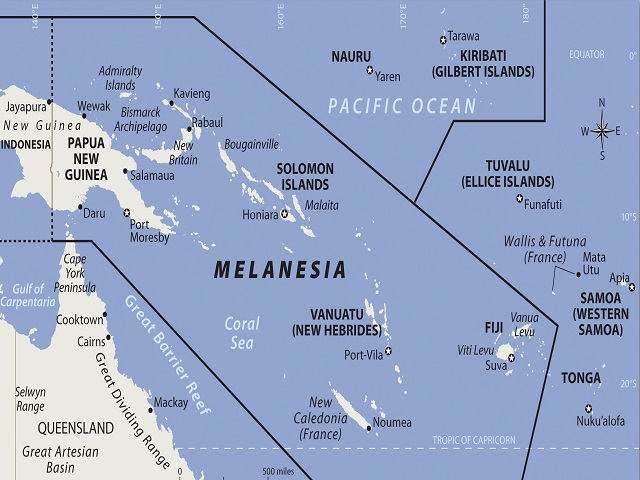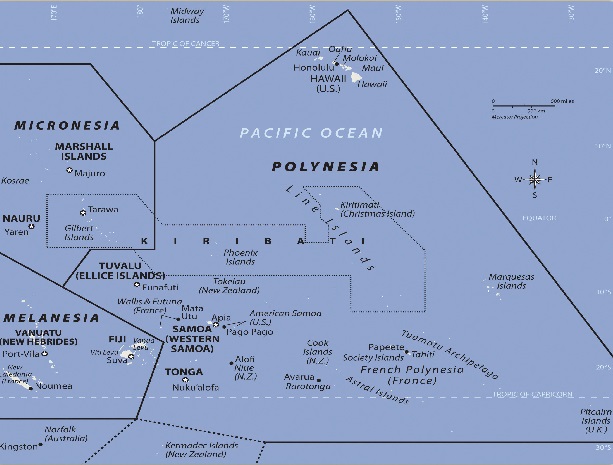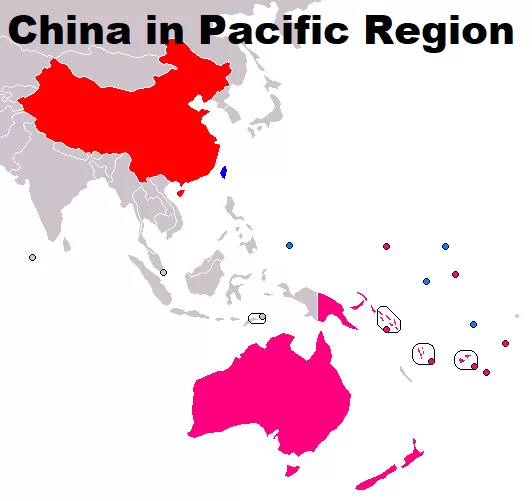Why in the News?
Recently the leaders of various small Pacific island countries like Samoa and Palau have raised their voice against China's expansionary policy in the region. It has been observed lately that China has been working on increasing hegemony in this region.
Pacific Islands:
1. The islands in the Pacific (of main geopolitical significance) are Palau, Papua New Guinea, Solomon Islands, Marshall islands, Vanuatu, Tuvalu, Fiji, Samoa. Tonga, Kiribati islands.
2. The islands can be divided into three main groups based on physical geography, local inhabitants, and location: Melanesia, Micronesia, and Polynesia.

3. The Pacific region is home to many islands and groups.
4. New Guinea is the largest one of them all where the maximum population of the area resides. These islands are mainly independent but many are also under colonial control.

5. The United States has been a major player in the post–World War II domination and control of various island groups. The Hawaiian Islands became the fiftieth US state in 1959.
6. The USA has many military bases in the Pacific islands and exercises control through Australia.
7. France also has a military presence in the New Caledonia islands.
China's increasing hegemony in the Pacific Region:
- The dominant policy has been in use since 2006 and China has evidently had an aggressive stance on Nine Dash Line in South China Sea too.
- Experts see the dominance over the Pacific islands as China's dream of becoming a world power as opposed to its claims of being the consequence of its increasing economic powers
- Foreign aid from China to the island countries of the Pacific has grown rapidly over the last few decades
- China has substantially increased its engagement with the Pacific island states by making use of its own identity as a South–South development partner in contrast to traditional (mainly Western) donors in the region.
- China’s diplomacy and engagement are based largely on bi-lateralism, and this is likely to continue for the foreseeable future.
- China's major aim of South Pacific diplomacy is to replace the US regional hegemony in the area. China can also counter USA's military presence in the region and its intelligence network by marking its presence in the area.
- China has been trying to annex Taiwan ever since and USA's presence in the Pacific region has helped Taiwan rise against China.
- China also seeks to isolate Taiwan diplomatically. Now Taiwan has just 15 diplomatic partners and the rest have been diplomatically convinced to stand against it by China.
- Another objective of China's increased determination to expand in the South China region is to generate greater bargaining powers at international level in the world. It thus wishes to expand its alliance worldwide.
- China has invested billions of dollars in these islands that have been ignored by the West for such a long time.
Risks to the West:
- Although China insists that it has no specific strategic interests in the Pacific region, the West thinks differently.
- There is no depth of scholarly Chinese works on the Pacific Islands. It does not factor heavily in official statements, speeches, or strategic documents from Beijing.
- China may try to use its leverage through diplomacy, economic debt, trade, or establishing a military base in the South Pacific.
- China, through elite capture and corruption may undermine the institutions of governance on which Western donors spend a lot of money while extending their support.
Effects on India:
India's supreme interest lies in peace and security in the Pacific region. India has been a major player in the Indian Ocean, however, China wants to change the status quo through its 'One Belt One Road' project.
It is important for India to ensure peace in Pacific and to strengthen the engagement in Pacific Islands, it must extend its Necklace of Diamonds strategy in the Indian Ocean.
Related| Iron Dome Explained: All about it's working & Israel's Missile Defense System here
Who will be the next Dalai Lama? Complete process of choosing the successor & China-Tibet struggle
